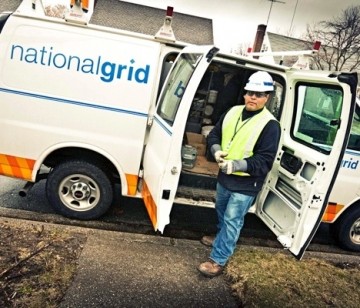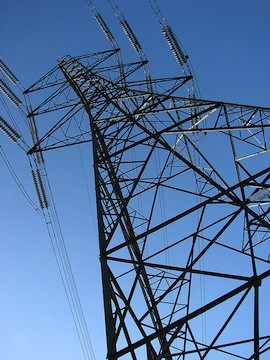Residents Protesting Smart Grid Pilot in Worcester
Thursday, March 21, 2013

The grid is designed to promote energy-conscious use of electricity and promote sustainability by allowing “two-way communication” between the meter and in-home electricity use. This would also allow energy companies to closely monitor each home’s energy use. But residents say that while the plan sounds good in theory, it is causing health issues and will be a costly venture to the state and to taxpayers.
Local resident, Clare Donegan, said that links between government and utility companies are keeping officials from acting against this program.
“Essentially, we’re paying to tax ourselves,” she said. “Officials are just following the money. There are really so many reasons they’re bad and there are different reasons that resonate with people.”
Patricia Burke, a resident who has had adverse physical reaction from the Smart Grid, says the program isn’t being implemented for the sustainable reasons touted by energy companies like National Grid.
“In and of itself, it doesn’t create any gains in conservation. It gives companies abilities to buy and sell more electricity,” she said. “It’s not just the health hazards. In theory, it seems like a good idea, but it is uninformed technological innovation. There is too much financial interest involved.”
Smart Grids have been implemented by various companies across the country and have been met with resistance in many states.
High Costs
Donegan said that using estimates from how much a Smart Grid system cost the state of Maine, Massachusetts could be looking at a $1 billion price tag.
“Maine implemented this type of grid statewide, and it cost them $192 million. Massachusetts, according the census we have 4.5 times as many homes as Maine, which means we’re looking at something around $1 billion,” she said. And when you look at how Mass. and Maine spend money, $1 billion is conservative figure.”
Donegan is concerned at the amount of tax dollars and bond money from the state that could be poured into this project which is currently being tested in Worcester, saying that the costs get shifted to the tax payer, doubly.

The Smart Grid system would include an additional charge for electricity being used during peak hours of the day.
Research at Massachusetts Institute of Technology (MIT) says that Smart Meters could compromise the power grid, and in the worst case scenario, “bring down the power grid.”
“Recent work by researchers in MIT’s Laboratory for Information and Decision Systems, however, shows that this policy could backfire. If too many people set appliances to turn on, or devices to recharge, when the price of electricity crosses the same threshold, it could cause a huge spike in demand; in the worst case, that could bring down the power grid.”
Privacy Issues
Donegan said that the main issue that has her concerned is the information recorded by Smart Meters, and that many residents would not want to voluntarily offer this up.
“The thing that got me irked is the big brother aspect,” she said. “These meters tell minute to minute what electricity you’re using – like someone literally peering through your window. When you get up, make coffee, whether you do two laundry two times a week, and they know when you’re away.”
Donegan said that overall, she worries what would happen to that data. “It’s worth billions,” she said.
According to the Congressional Research Service, "Unforeseen consequences under federal law may result from the installation of smart meters and the communications technologies that accompany them."

Worcester’s Pilot Program

According to National Grid, the current two-year pilot to implement and study smart grid applications in Worcester is the largest and most comprehensive in New England involving 15,000 customers.
The project covers 30 square miles in the Webster Square and Tatnuk Square, Airport Hill, and Northwest area of Worcester covering approximately 540 streets.
Overall costs for the Worcester pilot amounted to $57 million and was approved by the Massachusetts Department of Public Utilities in August 2012.
Upon approval, National Grid Massachusetts President Marcy Reed said that the company was excited about the project’s goals to cut energy use.
City Manager Michael O'Brien agreed, saying, “Worcester is very pleased the Massachusetts DPU has approved National Grid’s smart grid pilot program. The pilot’s goal of helping residents and businesses better understand and control their electricity usage, and providing National Grid additional tools to make the electrical system more reliable are priority concerns for the city as well.”
Approximately 15,000 smart meters were installed involving 45,000 residents.
One major benefit to the program, according to National Grid, includes the ability to charge electric cars during non-peak hours, but Donegan says that since Toyota has decreased manufacture due to low demand, this won’t be a reality.
Health Concerns
One Bay State group that has formed against Smart Grid implementation, Halt MA Smart Meters, is primarily concerned with problems a subset of people have when exposed to microwave radiation.
Those with Electromagnetic Hypersensitivity, like resident Patricia Burke, say that because of the constant electrical impulses sent out by the Smart Grid, she is hindered in her daily life.
“Three percent of the population experience adverse health effects due to electromagnetic radiation, and it is projected that up to 35 percent may have it, but many people are attributing their symptoms to other issues,” Burke said. “In just about every county people are starting to be diagnosed. Sweden was the first to officially recognize it.”
Donegan says that with the most recent installation, residents may be leaving the area.
“This is a whole subset of people who decide where they’re going to live based on cell towers. They use meters that can measure the amount of microwaves pulsing through a home,” she said. “Once they’re installed, they’ll have nowhere in Massachusetts. People have left the state where they are deploying these. They’re making them sick.”
Burke said that her symptoms range from head pressure to digestive issues and began after Smart Grids were installed in her neighborhood in California. She moved back to the Commonwealth to be with family, but says that the Smart Grid pilot in the area has made her symptoms increasingly worse.
“Immediately after they installed the Smart Meter on my house, I had a very adverse reaction. One of the ways lab testing confirms Electromagnetic Hypersensitivity, is inflammation,” she said. “It feels as though my body is out of sync – a sense that my body is no longer working in a coordinated way.”
Despite reports of health risks, the Smart Grid Consumer Collaborative says, “In-depth review of the scientific literature by the World Health Organization (WHO) revealed that the small amount of radio frequency (RF) energy produced by smart meters is not harmful to human health.”
Related Articles
- City Confronts National Grid on Worcester’s Black Outs
- Massive Rate Hikes Coming for National Grid Customers
- NEW: Coakley Hits National Grid with Record $16 Million in Fines
- NEW: National Grid Warns of Extended Power Outages
- NEW: National Grid to Bring “Smart Grid” to Worcester




Follow us on Pinterest Google + Facebook Twitter See It Read It